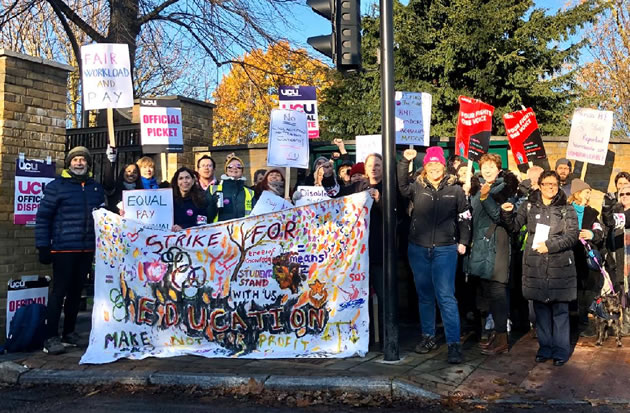More Strikes Taking Place at University of Roehampton
Industrial action over pay, contract conditions and workloads

Picket line outside University of Roehampton
A two week strike at universities across the country including the University of Roehampton is due to start this week.
It is the second wave of strikes this academic year over pay, contract conditions, claims of inequality and excessive workloads. More than 60,000 members will be taking strike action.
The strike, announced by the University and College Union (UCU), the trade union representing 120,000 academic and academic-related members, will start on February 20 and is to last for a total of 14 days. Staff at the University of Roehampton will be on strike on February 20-21, 24-26, and March 9-13, 16-19. Putney MP Fleur Anderson will be the picket lines on the first day of the strike.
In November and December 2019, staff in more than 60 universities participated in an eight-day strike. After re-balloting, 14 more universities are joining the industrial action.
Staff at the University of Roehampton say the key issues for them are inequality, job insecurity, work overload, and reduced pay. Although 60% of staff at the University are female, they are paid around 8% less than males and despite repeated attempts by Union members to get information regarding the Black and Ethnic Minority (BAME) pay gap, the University has not yet released any official data.
Some academics are employed and paid only for 11 months, before the University hires them again in September, while they still have to pay their bills and cover all their expenses during the month of August. Staff claim that the University of Roehampton has a workload model that does not recognise all the work that staff do and this results in excessive workloads and academics working evenings and weekends, an average of two extra days a week, unpaid. Although the number of students has increased by 18% in the last two years, the number of academics has gone down by 15%.
The union says that pay has dropped across the sector by 20% against inflation in the last decade. Staff are asking for a pay increase that would go up in line with inflation plus 3%. Vice Chancellors across the country have given themselves a pay rise of 3.5%, in addition to their already high, six-figure salaries and other benefits, including accommodation and private health insurance, while Roehampton members of staff are often forced to go and live outside London as they cannot afford to live closer to their own place of work.
Dr Jo Grady, General Secretary of UCU, visited the University of Roehampton during the previous strike and addressed the main picket line. There was 76% support for strike action in the ballot which had a turnout of 60%, one of the highest in the country.
The National Union of Students have declared their support for both the previous and the current strike. Postgraduate research students can be members of UCU for free and the union says are the ones most vulnerable, as casualization and low pay, among other problems, impact younger members of staff the most. The members of the Roehampton Student Union have joined staff at the picket lines.
A spokesperson from the University of Roehampton said: “This is a national dispute and as an individual institution we are doing all we can to encourage the University and College Union (UCU) and the University and Colleges Employers’ Association (UCEA) to reach an agreement as soon as possible. We are committed to the commitments and action in this UCEA document proposed to the UCU to resolve the dispute. Our focus is to mitigate, as far as it is possible, the impact of strike action on our students and we have extensive plans in place to achieve this objective.
“In a recent ballot members of the Roehampton Students Union resolved not to support the strike.
“Based on our gender pay gap report for data as of 31st March 2019, which will be published shortly, the median average pay for our female academics is the same as that for our male academics at £53,218.
“Our median gender pay gap is 5.32% whilst our mean gender pay gap is 6.8%. Sector average gender pay gaps are around 15%. However, we recognise there is more to do in reducing pay gaps.
“In the last year, all staff received a minimum 1.8% pay increase and many staff also receive a pay increase as they progress within the appropriate band on the salary scale, which is on average an additional 3%. The University's contribution to the Teachers' Pension Scheme is 23.68% of each members' salary per annum.
“We are committed to supporting those who identify as women and BAME in their careers through the provision of external leadership training and further initiatives.”
Since the end of the previous strike, staff have been undertaking Action Short of a Strike (ASOS), working only to contract, not covering for absent colleagues, not rescheduling lectures or classes cancelled due to strike action, and not undertaking any voluntary activities.
UCU is seeking an agreement with the Universities and Colleges Employers Association (UCEA) on a National Framework to protect staff from these alleged excessive workloads, pay inequalities, and causal and non-permanent contracts. In pre-1992 Universities there is also a second dispute regarding pensions.
February 19, 2020